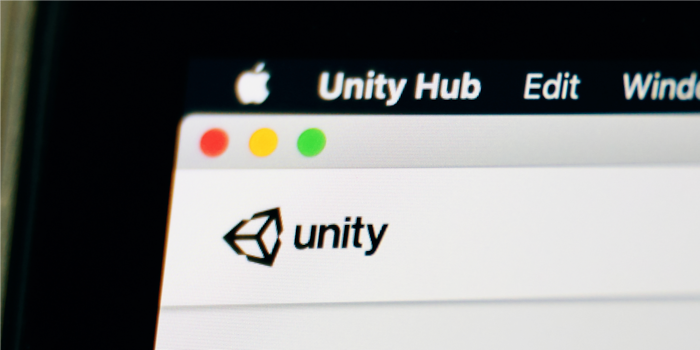
Game engine Unity annoys indie studios with bizarre payment structure
The game engine Unity has announced major changes to its payment model. This is causing trouble for many indie studios.
Update 18.09.
Unity apologises for the new policy in a post on X (formerly Twitter) and announces changes to the planned payment model.
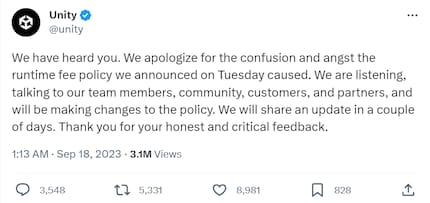
The company writes: "We heard you. We apologise for the confusion and upset the announced policy has caused. We are listening, talking to our team members, our Community, our customers and partners, and will be changing the policy. We will publish an update in a few days. We thank you for your honest and critical feedback."
Unity is leaving it open as to when the changes will be communicated and which aspects of the new payment model will be adjusted.
Unity is one of the largest and most successful game engines in the world. Small to medium-sized studios in particular use it to develop their games. "Pokémon Go", "Cities: Skylines", "Cuphead", "Among Us" and "Beat Saber" are just some of the examples of big hits that have been developed with Unity in recent years.
Now the company has announced far-reaching changes to its pricing model. These could potentially bankrupt smaller studios.
These are the changes to the payment model
Until now, studios only paid an annual fee for using the engine. The amount of the fee depends on the company's turnover - the more turnover the company generates, the more expensive the licence becomes. Small studios or individuals even receive a free licence.
Unity is now introducing an additional monthly fee based on the number of downloads of a game. The so-called "runtime fee". The more often a game is downloaded and launched, the more a studio has to pay Unity. However, this only happens after a certain number of installations. This limit varies depending on the licence booked.
Smaller studios that use the free Unity licence have to pay 20 cents per additional installation from 200,000 downloads. Larger companies with the more expensive "Unity Pro" and "Unity Enterprise" licences will be asked to pay above a limit of one million downloads. Compared to the free Unity licence, the price per additional installation is lower for "Pro" and "Enterprise".
A detailed breakdown of the costs can be found in the official FAQ on the new payment model. It is due to come into force from 1 January 2024.
Why are these changes problematic?
The changes have potentially serious implications for smaller studios, which will be faced with additional costs that would not have been incurred under the old licence model. Games that are frequently downloaded but generate little revenue are particularly affected. Free-to-play games are one example. Due to the high number of free downloads, these games generate immense costs with the new installation fees, which cannot be covered by the revenue. It is also problematic when games are offered in giveaways, bundles, on sales or in subscription services such as the Xbox Game Pass.
In all examples, the problem is identical: the games are downloaded "too often" and therefore generate immense costs.
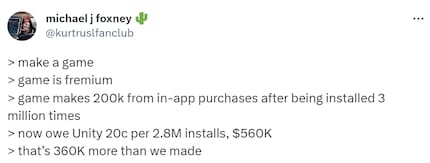
Source: Domagoj Belancic / X
There is a lot of confusion surrounding the question of exactly how Unity will track downloads. There are also fears of potential "install-bombing". Disgruntled users could exploit the new system and drive studios to ruin with repeated installations of the same game.
What do developer studios say about this?
Many well-known indie studios have spoken out on X (formerly Twitter) and expressed their displeasure. The studios are furious that Unity has retroactively changed the terms and conditions. Some companies are even being forced into the new fee model because they no longer have enough time to cancel their current licence in time, explains consultant Rami Ismail.
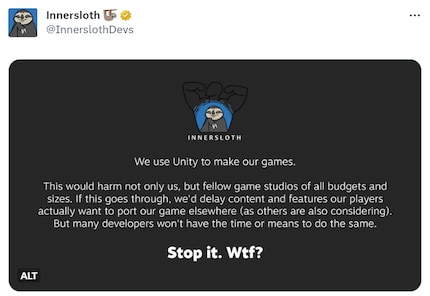
Source: Domagoj Belancic / X
Numerous developers are unable to bear the potentially immense costs associated with the new model. They see Unity's radical move as an irreparable breach of trust. Many studios can no longer imagine a serious business relationship, even if the company were to withdraw the changes.
For example, Innersloth ("Among Us"), Massive Monster ("Cult of the Lamb"), Mega Crit ("Slay the Spire"), Aggro Crab ("Another Crab's Treasure") and Crema ("Temtem") have announced that they will be switching to a different engine for their next game. This will cause additional costs and delays. However, these are the lesser of two evils compared to the additional costs in the new Unity fee model.
Swiss developer studios are also affected by the change. When asked, Philomena Schwab, co-founder of Stray Fawn Studio, described Unity's announcement as "existence-threatening". Although Unity has since backtracked a little (see below), the new fee model is still unacceptable for the studio. Stray Fawn have also lost confidence in a business relationship with Unity and are looking for "suitable alternatives".
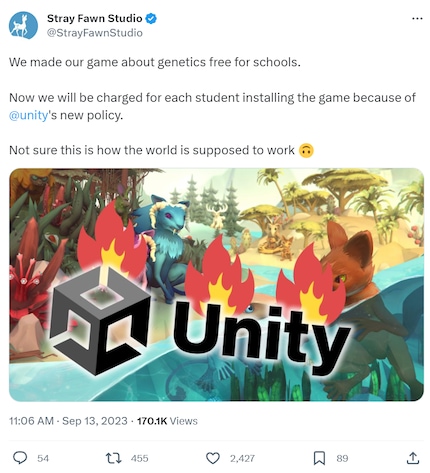
Source: Domagoj Belancic / X
How does Unity react?
According to Unity, the additional fees are essential to ensure the development of the engine. The company is trying to respond to the numerous angry reactions and is causing even more confusion with contradictory statements. Unity has summarised the latest state of affairs in a thread on X. According to this information, the company is backtracking at least a little on some key points.
For example, there will be no fees for multiple installations. This would make "install bombing" impossible. Demos and charity bundles are also not included in the fee model. For games that are offered in subscription services such as the Xbox Game Pass, the additional costs are to be incurred by the supplier of the service and not by the developer studio. Nevertheless, these specifications are not satisfactory for the studios.
Many developers have not been satisfied with the game engine for a long time. This is mainly due to the current CEO John Riccitello, who took the helm ten years ago. Under the ex-EA manager, the company has increasingly incurred the displeasure of the developer community with dubious decisions and statements. Last year, Riccitello labelled developers who do not primarily think about monetising their games as "biggest fucking idiots" https://www.eurogamer.net/unity-boss-slammed-for-criticising-mobile-devs-who-dont-prioritise-monetisation. On Thursday, the company closed two offices and cancelled a public speech by Riccitello. The company cited "serious death threats" as the reason.
My love of video games was unleashed at the tender age of five by the original Gameboy. Over the years, it's grown in leaps and bounds.
From the latest iPhone to the return of 80s fashion. The editorial team will help you make sense of it all.
Show all